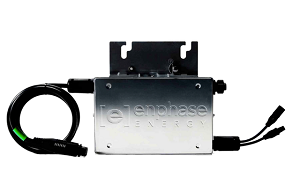New data finds microinverters are more reliable converters of solar DC to AC
 In two different studies, Enphase Energy’s microinverters have proven to be more reliable than conventional, centralized inverter systems. The studies were conducted by Westinghouse Solar, which exclusively uses Enphase microinverters, and by SunEdison, which uses a mix of inverter technologies.
In two different studies, Enphase Energy’s microinverters have proven to be more reliable than conventional, centralized inverter systems. The studies were conducted by Westinghouse Solar, which exclusively uses Enphase microinverters, and by SunEdison, which uses a mix of inverter technologies.
“The data, collected separately and independently by Westinghouse Solar and SunEdison over a two-year period from 2008 to 2010, show the reliability of microinverters is 45 to 70 times greater than traditional central inverters,” according to an Enphase press release.
The Westinghouse Solar study found that Enphase microinverters were 45 times more reliable than traditional inverters, while the SunEdison study showed that microinverters were 70 times more reliable than conventional inverters, said Enphase spokesperson Christine Bennett. SunEdison compared multiple microinverter options to both utility-scale and commercial-scale inverters, she said.
Microinverters convert the DC current produced by photovoltaics into AC current on each module and can send production information back to a centralized hub. A centralized inverter system allows for all or a portion of the DC electric produced by an array to be converted into AC current in one place.
“Because we have such a low failure rate, if one of our microinverters has a problem, it’s just that one that goes down, not the rest [of the array],” Bennett said. Maintenance professionals can more quickly identify which panels in an array aren’t working properly and whether the inverter itself is operating properly.
Microinverters add a premium to the price of solar.
“The short answer is that we are a premium upfront cost,” Bennett said.
A centralized inverter comprises roughly 50 cents per watt of the cost of a solar array, whereas microinverters comprise roughly between 65 and 70 cents per watt for a photovoltaic system, according to Bennett.
Enphase microinverters carry a warranty, and over time, their conversion efficiency lowers the levelized cost of electricity over time, Bennett said. According to her, the microinverters currently convert DC current into AC current at a 95 percent efficiency rate.
Conventional inverter systems also carry some potential additional costs, like central monitoring and a warranty.
“Really, what we’re selling is a complete system,” she said.
A growing number of solar manufactures are building Enphase microinverters into their modules. Westinghouse Solar uses them in all their panels. Other companies, including Canadian Solar and Suntech, use Enphase microinverters in some of the modules as well.



